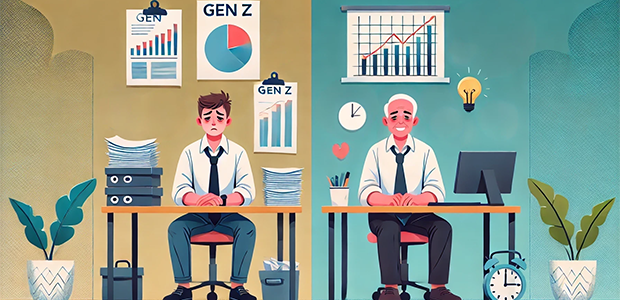
Gen Z workers struggling to survive in modern workplaces while boomers thrive
Gen Z workers are struggling to find their footing in the workplace, while their Boomer colleagues seem to be thriving, according to a new report from Employment Hero, a global employment technology platform. The "Wellbeing at Work" study, which surveyed over 1,000 full-time employees across the UK, highlights the challenges younger workers face in adapting to their work environment.
Nearly three-quarters (72%) of Gen Z employees reported experiencing burnout within the past three months, compared to just 44% of Boomers. Stress levels were notably higher among Gen Z, with 23% feeling stressed every day and 44% stressed a few days each week, while only 6% of Boomers reported daily stress.
Mental health concerns were also more pronounced among Gen Z, with only 41% expressing satisfaction with their mental health, compared to 63% of Boomers. Financial stress was a significant factor for Gen Z, with 42% identifying it as their main source of stress.
Despite their struggles, Gen Z workers weren’t seeking a less demanding workload; only 7% suggested this as a solution, compared to 15% of Boomers. Instead, younger employees were looking for support and understanding in navigating their challenges.
Kevin Fitzgerald, UK MD of Employment Hero said: "This generational chasm must not be ignored or dismissed as the result of an ‘entitled generation’. These young workers will be running the entire economy before long, and we desperately need them to succeed in the workplace, not drown in it.
“Addressing this isn’t as simple as offering a few pizza days every month. Managers need to sit down with their younger employees and really understand the demands being placed upon them, and make sure they have the skills to take them on.
“Burnout shouldn’t be seen as a fact of life. We know from our own experience at Employment Hero that emphasising flexibility in the workplace is crucial to keeping people happy and engaged. This isn’t about giving the young an easy ride – the data shows they are the least likely to want less work – it’s about giving them the setting they need to thrive.”
Kimi Powell, Director of Clinical Services at employee wellbeing platform, Sonder commented: "Burnout isn't inherent to demanding work, it's a consequence of prolonged, unmanaged stress. While a healthy level of stress can be motivating, chronic activation of our fight or flight response depletes emotional and physical resources. Recognising this shift, from helpful stress to debilitating burnout is crucial for both individuals and organisations.”

